1. introduction to english literature
Introduction to English literature英美文学选读张伯香
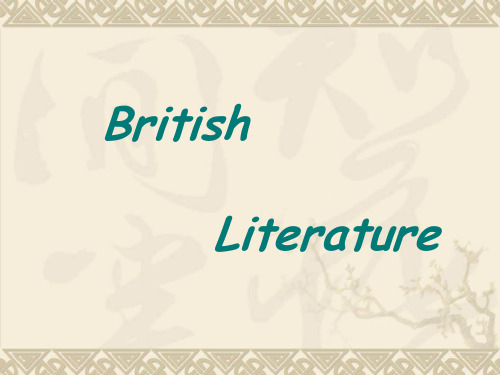
Literature
•
What’s Literature? The word ―literature‖ came into English from the 14th
century in the sense of polite learning through reading. Thus a man of literature, or a man of letters, meant what we would now describe as a man of wide reading. So, this word corresponds mainly to the modern meaning of the word ― literacy精通文学,有文化.‖ From the mid-18th century, literature referred to the practice and profession of writing. This appears to be closely connected with the heightened self -consciousness of the profession of authorship. Since the 19th century, literature has been the high skills of writing in the especial context of high imagination.
Recommended Novels for Reading
A Novel Without a Hero
tragic fate of a ―pure‖ young peasant woman at the time of capitalist invasion into the country in the 19th-century England
英语文学导论

英语文学导论Introduction to English LiteratureEnglish literature is the body of written works produced in the English language, including novels, poetry, plays, and essays. It is a rich and diverse field with a history spanning centuries, encompassing both the classic works of Shakespeare and Dickens, as well as the contemporary voices of Margaret Atwood and Zadie Smith. English literature is a reflection of Britain’s cultural, social, and political history, encapsulating its values and beliefs, and its changing traditions and viewpoints.Early English LiteratureEnglish literature can be traced back to the epic poem Beowulf, written in Old English, the language spoken by the Anglo-Saxons. Anglo-Saxon literature, also known as Old English literature, comprises works written in England from the 7th to the 11th century, including religious texts, such as The Venerable Bede’s Ecclesiastical History of the English People, and epic poems, such as Beowulf. The Norman Conquest in 1066 brought about significant changes in the English language and literature, with the emergence of Middle English and the works of Chaucer, which marked the beginning of the English Renaissance.English RenaissanceThe English Renaissance is a period encompassing the 16th and 17th centuries, which saw a revival of classical learning, the development of humanism, and the emergence of new literarygenres, such as the sonnet and the novel. It was a time of great intellectual and artistic achievements, with the works of Elizabethan playwrights such as Christopher Marlowe and William Shakespeare transforming the English stage, and the publication of the King James Bible, one of the most influential works of English literature.RomanticismThe Romantic period, which spanned the late 18th to mid-19th century, was a reaction against the Enlightenment and its emphasis on reason and logic. Romantic writers sought to evoke emotions rather than explain them, emphasizing the individual and the imagination, and exploring the spiritual and supernatural. Important romantic poets include William Wordsworth, Samuel Taylor Coleridge, and John Keats, while the novels of Sir Walter Scott and Jane Austen are considered among the greatest works of the period.Victorian LiteratureThe Victorian era, which lasted from 1837 to 1901, saw significant social and cultural changes and produced some of the most enduring works of English literature. The Victorian novel, such as Charles Dickens’ Great Expectations and Charlotte Bronte’s Jane Eyre, explored themes of social injustice, morality, and class conflict. The poetry of Alfred Tennyson and Robert Browning also flourished during this period, as did the works of non-fiction writers, such as John Ruskin and Charles Darwin.ModernismThe modernist period, which lasted from the late 19th to the mid-20th century, represented a break from traditional literary forms and conventions, marked by experimentation and fragmentation. Modernist writers such as Virginia Woolf and James Joyce explored the themes of memory, identity, and consciousness, while the poetry of T.S. Eliot and W.B. Yeats experimented with form and language, and challenged traditional literary conventions. The works of modernist writers continue to influence contemporary literature.Contemporary LiteratureContemporary English literature is a diverse and eclectic field, encompassing a range of genres, styles, and themes. The literature of the post-World War II era was shaped by the traumas of the war and the changing social, cultural, and political landscape, with important writers such as Samuel Beckett and Doris Lessing emerging during this time. Contemporary English literature includes the works of Salman Rushdie, Ian McEwan, Zadie Smith, Kazuo Ishiguro, and Margaret Atwood, among others.ConclusionEnglish literature is a rich and varied field that reflects the changing social, cultural, and political landscape of Britain. From the epic poem Beowulf to the contemporary works of writers such as Margaret Atwood, English literature has evolved through different eras, styles, and genres, reflecting the values, beliefs, andconcerns of its time. As a window into British culture and history, English literature is a vital part of the world’s literary heritage.The evolution of English literature can be seen as a reflection of the changing attitudes, beliefs, and concerns of British society. From the early religious texts of the Anglo-Saxon era to the modernist experimentation of the 20th century, English literature has undergone significant transformations and reinventions.The influence of foreign cultures, such as French and Italian literature, can also be seen throughout the development of English literature. The medieval works of Chaucer and Sir Gawain and the Green Knight were heavily influenced by French and Italian literature, while Shakespeare drew inspiration from classical Greek and Roman plays.Religion has also played an important role in English literature throughout its history. The Bible, both in its religious and secular forms, has been a source of inspiration for countless writers, influencing the language, themes, and imagery of their works. The intersection of religion and literature can be seen in works such as John Milton’s Paradise Lost and William Blake’s Songs of Innocence and Experience.One of the defining features of English literature is its diversity, with multiple genres and styles that have evolved over time. The novel, for example, was a relatively new form of literature in the 18th and 19th centuries, but has since become one of the most popular and enduring forms of literature. Some of the most iconic English novels, such as Jane Austen’s Pride and Prejudice and Charles Dickens’ Great Expectations, continue to be studied andenjoyed by readers around the world.Poetry has also played a significant role in English literature, with numerous notable poets throughout its history. From the Romantic era of Keats and Wordsworth to the modernist experimentation of T.S. Eliot and W.B. Yeats, poetry continues to be a powerful and expressive form of artistic expression.Perhaps one of the most remarkable features of English literature is its ability to adapt and change with the times. From the religious texts of the Anglo-Saxon era to the post-modern experimentationof the 21st century, English literature has shown an incredible range and flexibility in its ability to reflect the changing attitudes and concerns of its time.One example of this adaptability can be seen in the emergence of post-colonial literature in the 20th century. As Britai n’s political and cultural influence began to wane, writers from former colonies, such as Salman Rushdie and Chinua Achebe, began to explore the experiences of their own cultures and societies, challenging traditional Western perspectives and offering new insights into the complexities of post-colonial identity and history.The impact of English literature can also be seen in its widespread global influence. From the works of Shakespeare to the contemporary authors of today, English literature continues to inspire and influence writers and readers around the world. The language and imagery of English literature have become a part of the collective consciousness of many cultures, shaping the way in which we understand and relate to our world.In conclusion, English literature is a rich and varied field that has reflected the changing values, beliefs, and concerns of British society throughout its history. Its ability to adapt and evolve with the times, as well as its global influence, has made it an important and enduring part of the world’s literary heritage. The continued study and appreciation of English literature is vital in understanding both Britain’s cultural past and its present.。
英国文学史选读复习资料
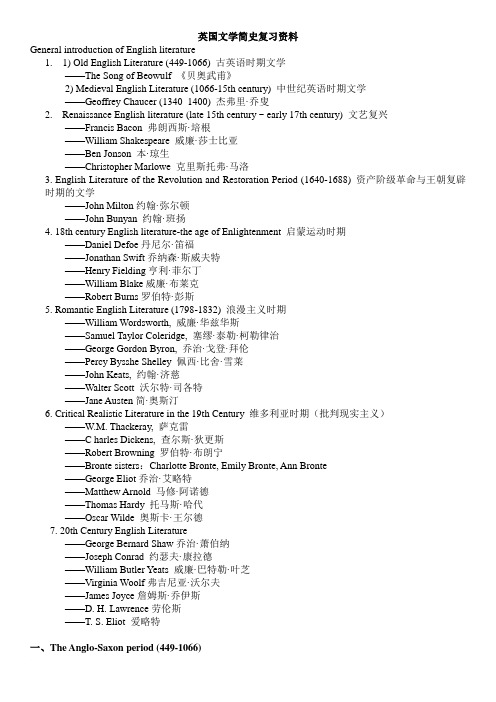
英国文学简史复习资料General introduction of English literature1. 1) Old English Literature (449-1066) 古英语时期文学——The Song of Beowulf 《贝奥武甫》2) Medieval English Literature (1066-15th century) 中世纪英语时期文学——Geoffrey Chaucer (1340_1400) 杰弗里·乔叟2. Renaissance English literature (late 15th century ~ early 17th century) 文艺复兴——Francis Bacon 弗朗西斯·培根——William Shakespeare 威廉·莎士比亚——Ben Jonson 本·琼生——Christopher Marlowe 克里斯托弗·马洛3. English Literature of the Revolution and Restoration Period (1640-1688) 资产阶级革命与王朝复辟时期的文学——John Milton约翰·弥尔顿——John Bunyan 约翰·班扬4. 18th century English literature-the age of Enlightenment 启蒙运动时期——Daniel Defoe丹尼尔·笛福——Jonathan Swift乔纳森·斯威夫特——Henry Fielding亨利·菲尔丁——William Blake威廉·布莱克——Robert Burns罗伯特·彭斯5. Romantic English Literature (1798-1832) 浪漫主义时期——William Wordsworth, 威廉·华兹华斯——Samuel Taylor Coleridge, 塞缪·泰勒·柯勒律治——George Gordon Byron, 乔治·戈登·拜伦——Percy Bysshe Shelley 佩西·比舍·雪莱——John Keats, 约翰·济慈——Walter Scott 沃尔特·司各特——Jane Austen简·奥斯汀6. Critical Realistic Literature in the 19th Century 维多利亚时期(批判现实主义)——W.M. Thackeray, 萨克雷——C harles Dickens, 查尔斯·狄更斯——Robert Browning 罗伯特·布朗宁——Bronte sisters:Charlotte Bronte, Emily Bronte, Ann Bronte——George Eliot乔治·艾略特——Matthew Arnold 马修·阿诺德——Thomas Hardy 托马斯·哈代——Oscar Wilde 奥斯卡·王尔德7. 20th Century English Literature——George Bernard Shaw乔治·萧伯纳——Joseph Conrad 约瑟夫·康拉德——William Butler Yeats 威廉·巴特勒·叶芝——Virginia Woolf弗吉尼亚·沃尔夫——James Joyce詹姆斯·乔伊斯——D. H. Lawrence劳伦斯——T. S. Eliot 爱略特一、The Anglo-Saxon period (449-1066)1、这个时期的文学作品分类:pagan(异教徒) ,Christian(基督徒)2、代表作:The Song of Beowulf《贝奥武甫》( national epic 民族史诗) 采用了隐喻metaphor手法3、Alliteration 头韵(写作手法)例子:of m an was the m ildest and m ost beloved,To his k in the k indest, k eenest for praise.二、The Anglo-Norman period (1066-1350) 盎格鲁—诺曼时期1、romance 传奇文学2、代表作:Sir Gawain and the Green Knight (高文爵士和绿衣骑士) 是一首押头韵的长诗三、Geoffrey Chaucer (1340-1400) 杰弗里·乔叟时期1、the father of English poetry 英国诗歌之父2、heroic couplet 英雄双韵体:a verse unit consisting of two rhymed(押韵) lines in iambic pentameter(五步抑扬格)3、代表作:The Canterbury Tales 《坎特伯雷的故事集》(英国文学史的开端)大致内容:the pilgrims are people from various parts of England, representatives of various walks of life and social groups. 朝圣者都是来自英国的各地的人,代表着社会的各个不同阶层和社会团体小说特点:each of the narrators tells his tale in a peculiar manner, thus revealing his own views and character. 这些叙述者以自己特色的方式讲述自己的故事,无形中表明了各自的观点,展示了各自的性格。
大学英语四级考试听力部分长对话大学英语四级考试听力
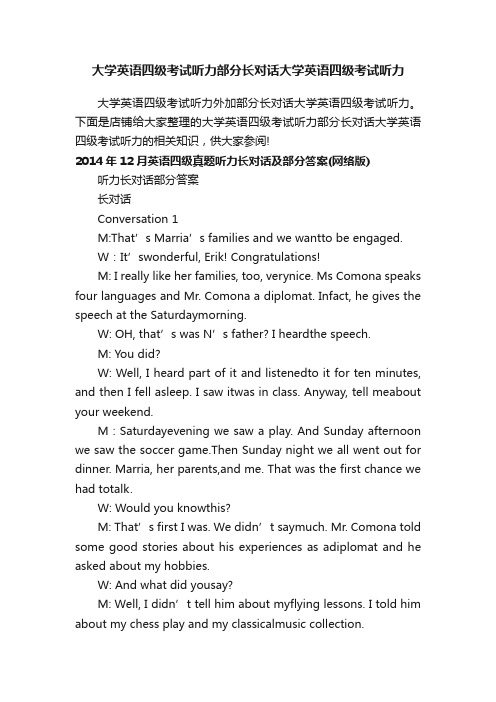
大学英语四级考试听力部分长对话大学英语四级考试听力大学英语四级考试听力外加部分长对话大学英语四级考试听力。
下面是店铺给大家整理的大学英语四级考试听力部分长对话大学英语四级考试听力的相关知识,供大家参阅!2014年12月英语四级真题听力长对话及部分答案(网络版) 听力长对话部分答案长对话Conversation 1M:That’s Marria’s families and we wantto be engaged.W:It’swonderful, Erik! Congratulations!M: I really like her families, too, verynice. Ms Comona speaks four languages and Mr. Comona a diplomat. Infact, he gives the speech at the Saturdaymorning.W: OH, that’s was N’s fa ther? I heardthe speech.M: You did?W: Well, I heard part of it and listenedto it for ten minutes, and then I fell asleep. I saw itwas in class. Anyway, tell meabout your weekend.M:Saturdayevening we saw a play. And Sunday afternoon we saw the soccer game.Then Sunday night we all went out for dinner. Marria, her parents,and me. That was the first chance we had totalk.W: Would you knowthis?M: That’s first I was. We didn’t saymuch. Mr. Comona told some good stories about his experiences as adiplomat and he asked about my hobbies.W: And what did yousay?M: Well, I didn’t tell him about myflying lessons. I told him about my chess play and my classicalmusic collection.W: Good idea! Her parents reallyapproval of you. Don’t they?M: I guess so. Marria called thismorning and said,” My father told me he’ll like you sunny rightnow”W: That was great.M: Not exactly. I want to get marriedafter I graduated school in about three years.Q9: what does theconversation aboutMarria’s father?Q10:What does Marria andErik do last Sunday afternoon?Q11:What do we learn fromMarria’s phone call this morning?Conversation 2M:You’re going to wear out computer’skeyboard.W: Oh, hi!M: Do you have any idea what time itis?W: About ten or tenthirty?M: It’s merelymidnight.W: Real ly? I didn’t know it was solate.M: Don’t you have an early class toteach tomorrowmorning?W: Yes, at seven o’clock, my computerclass. The students go to work right after theirlesson.M: Then you ought to go to bed. What areyou writing anyway?W: An article, I hope I cansell.M:Oh, another view ofnewspaper pieces. What’s this oneabout?W:Do you remember the trip I took lastmonth?M: The one up to theAmazon?W: Well, that’s what I’m writing about.The new high-way and the changes is making in the Amazonvalley.W:It shouldbe interesting.W:It is. Iguess that’s why I forgot all about thetime.M:How many articles have you solvenow?W:About a dozen sofar.M:What kind of newspapers bythem?W:The paper is carrying a lot of foreignnews. They usually appear in the big Sunday editions where theyneed a lot background stories to help develop the space between theads.M:Is thereany future in it?W: I hope so. There’s a chance I maysell this article to a news service.M:Then your papers will be published inseveral papers winter.W: that’s the idea. And they might evenbe able to do other stories the on a regularbasis.M:That would be great.Q12: what is the woman’soccupation?Q13:what is the womanwriting about?Q14:where did the woman’sarticles usually appear?Q15:what does the womanexpect?大学英语四级考试听力部分长对话大学英语四级考试听力1 Questions 19 to 21 are based on the conversation you have just heard.19.[A] In a college bookstore.[B] In a lecture hall.[C] In a library.[D] In a domp3itory.20.[A] English.[B] Biology.[C] Introduction to English Literature.[D] A required course.21. [A] He lives on the 10th floor of Butler Hall.[B] He never wants to listen to students.[C] He used to teach biology.[D] He is an excellent professor.Questions 22 to 25 are based on the conversation you have just heard.22.[A] When to move.[B] Where to live the following year.[C] How much time to spend at home.[D] Whose house to visit.23. [A] Take some money to the housing office.[B] Infomp3 the director of student housing in a letter.[C] Fill out a fomp3 in the library.[D] Maintain a high grade average.24. [A] Both live on campus.[B] Both live off campus.[C] The man lives on campus; the woman lives off campus.[D] The woman lives on campus; the man lives off campus.25. [A] Grades.[B] Privacy.[C] Sports.[D] Money.Conversation OneW: Excuse me, are you going to buy that book?M: Well, I need it for a class but it’s awfully expensive.W: Oh, we must be in the same class. Introduction to British Literature?M: Yes, that’s the one. Were you there yesterday for the first class?W: I sure was. Professor Robert really seems to know his subject.M: Yes, I took his Shakespeare course last semester and it wasvery good. He likes listening to his students.W: That’s a relief. I’m a biology major and I was a little uncertain about taking an English course.M: I’m an English major and this is a required course. But now I’m in trouble because I’m not sure I can afford this book.W: Hey, I’ve got an idea. Why don’t we split the cost and share the book?M: Sounds great. Do you live on campus?W: Yeah, I live on the 10th floor of Butler Hall.M: Perfect. I live on the 3rd floor of Butler. We should have no trouble sharing the book. I can bring it up to your room right after I wrap up the assignment.W: It’s a deal.Questions 19 to 21 are based on the passage you have just heard.19. Where is the conversation most probably taking place?【解析】选[A]。
An introduction to English literature英国文学简介
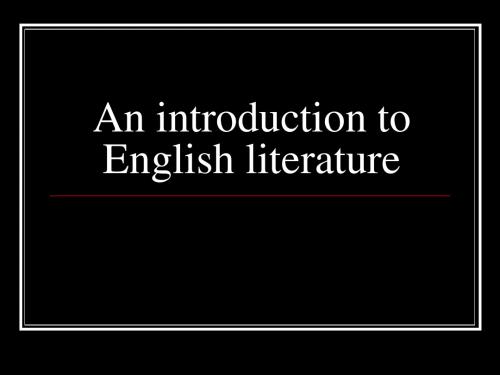
Formal Theories Rhetorical Theories
Expressive Theories
Author
Audience
Poem
World
Author
Audience
Why do we learn literature?
It is just a course to get scores To make us more civilized, qualified and knowledgeable To amuse ourselves and others For further study 1.Postgraduate of English and American literature in FL institute 2. Postgraduate of literature of foreign countries in Chinese department research
Aims of this course
1.
2. 3.
4.
To introduce learners to the imaginative use of English and to help them towards an appreciation of literary language and literature; To consolidate and extend the learners’ knowledge and fluency in English through interaction with literary texts; To further develop the learners’ ability to recognize and express emotional and moral attitudes on a higher level than about daily occurrences so as to facilitate their communication with educated native speakers; To prepare the learners for the study of literature in English at a higher level and to help them develop interest in and, hopefully, the habit of, reading extensively .
大学英语教材目录

大学英语教材目录Unit 1: Introduction to English1.1 Basic English Grammar1.2 Vocabulary Building1.3 Listening and Speaking Skills1.4 Reading and Writing SkillsUnit 2: Communication Skills2.1 Effective Communication Strategies2.2 Interpersonal Skills2.3 Public Speaking and Presentation Skills2.4 Business CommunicationUnit 3: English for Academic Purposes3.1 Academic Writing Skills3.2 Critical Thinking and Analysis3.3 Research and Citations3.4 Academic Reading and Note-takingUnit 4: Literature and Culture4.1 Introduction to Literary Analysis4.2 British Literature4.3 American Literature4.4 World LiteratureUnit 5: English for Specific Purposes 5.1 English for Science and Technology 5.2 English for Medical Professionals 5.3 English for Tourism and Hospitality 5.4 English for Business and Finance Unit 6: Language and Society6.1 Sociolinguistics6.2 Language Variation and Dialects 6.3 Language and Identity6.4 Language in the MediaUnit 7: Language Skills Development 7.1 Listening Comprehension7.2 Speaking Fluency7.3 Reading Comprehension7.4 Writing ProficiencyUnit 8: English as a Global Language 8.1 History and Evolution of English8.2 English as a Lingua Franca8.3 English in the Digital Age8.4 Language Policy and PlanningUnit 9: English Grammar and Usage9.1 Parts of Speech9.2 Verb Tenses and Forms9.3 Sentence Structure9.4 Word Order and SyntaxUnit 10: Language Acquisition and Learning 10.1 First Language Acquisition10.2 Second Language Learning10.3 Language Learning Strategies10.4 Bilingualism and MultilingualismUnit 11: English Phonetics and Phonology11.1 Speech Sounds and Phonetics Symbols11.2 Pronunciation Patterns and Rules11.3 Intonation and Stress Patterns11.4 Connected Speech and LinkingUnit 12: English Language Teaching Methodology12.1 Approaches and Methods in Language Teaching 12.2 Lesson Planning and Materials Development 12.3 Classroom Management and Assessment12.4 Technology Integration in Language Teaching Unit 13: English for Specific Professions13.1 English for Engineering13.2 English for Law13.3 English for Journalism13.4 English for EducationUnit 14: English Language and Globalization14.1 Communication in a Globalized World14.2 Cross-cultural Communication14.3 Language and Identity in a Global Context 14.4 World EnglishesUnit 15: English Language Testing and Assessment 15.1 Types of Language Tests15.2 Test Preparation Strategies15.3 Test Validity and Reliability15.4 Assessment of Speaking and Writing SkillsUnit 16: English for Academic Research16.1 Literature Review and Research Proposal Writing16.2 Data Collection and Analysis16.3 Academic Presentation Skills16.4 Thesis and Dissertation WritingThis is a sample table of contents for a university-level English language textbook. The topics covered in each unit provide a comprehensive overview of the various aspects of English language learning and usage. The textbook aims to enhance students' communication skills, critical thinking abilities, and cultural understanding. Each unit includes a range of activities, exercises, and readings to engage students and facilitate their language development.。
poetry (1)a

1) 2) 3) 4) 5)
Requirements: To master the basic elements of poetry and fiction; To know the literary trends: romanticism, realism, naturalism, modernism, postmodernism; To understand some literary critical or cultural approaches to literature Final Aims: To improve students’ literary taste, dialectical or critical ability and writing ability; To broaden their thinking and open their vision in their life and study.
2. Thematic Approach
The main concern: the ideas and the themes of a literary writing to dig out what is represented about life and society in a literary work. to obtain some philosophical and generalized ideas about peace and war, participation and alienation, friendship and hatred, men and women, responsibility and desertion, as well as the meaning of existence, the nature of humanity, the reality of love, death, society, individual, and so on.
最全大学课程英文名称
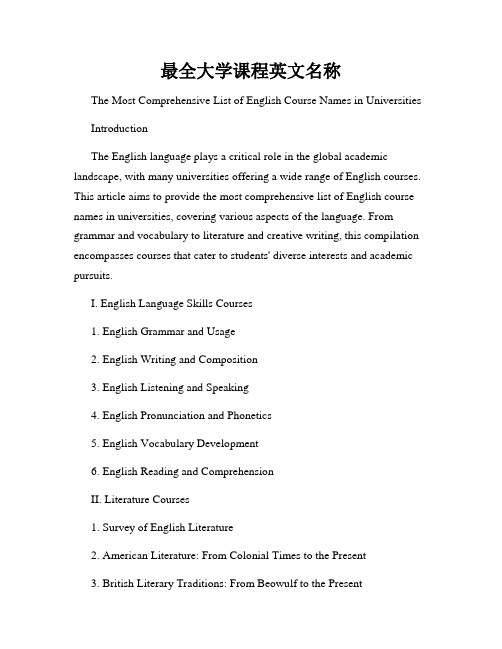
最全大学课程英文名称The Most Comprehensive List of English Course Names in UniversitiesIntroductionThe English language plays a critical role in the global academic landscape, with many universities offering a wide range of English courses. This article aims to provide the most comprehensive list of English course names in universities, covering various aspects of the language. From grammar and vocabulary to literature and creative writing, this compilation encompasses courses that cater to students' diverse interests and academic pursuits.I. English Language Skills Courses1. English Grammar and Usage2. English Writing and Composition3. English Listening and Speaking4. English Pronunciation and Phonetics5. English Vocabulary Development6. English Reading and ComprehensionII. Literature Courses1. Survey of English Literature2. American Literature: From Colonial Times to the Present3. British Literary Traditions: From Beowulf to the Present4. Shakespearean Drama and Sonnets5. Contemporary World Literature6. Gender Studies in LiteratureIII. Linguistics Courses1. Introduction to Linguistics2. Syntax and Semantics3. Phonology and Phonetics4. Sociolinguistics: Language and Society5. Psycholinguistics: Language Acquisition and Processing6. Applied Linguistics: Language Teaching and Assessment IV. English for Specific Purposes (ESP) Courses1. Business English2. Legal English3. Medical English4. Academic English for Non-Native Speakers5. English for Tourism and Hospitality6. Technical English for Engineering and ScienceV. Creative Writing Courses1. Fiction Writing2. Poetry Writing3. Scriptwriting for Film and Television4. Creative Nonfiction Writing5. Playwriting and Dramatic Structure6. Experimental Writing and Prose PoetryVI. English as a Second Language (ESL) Courses1. ESL Grammar and Writing2. ESL Listening and Speaking3. ESL Reading and Vocabulary4. ESL Pronunciation and Intonation5. ESL Academic Writing and Research Skills6. ESL Communication for Academic and Professional Settings VII. English for Academic Purposes (EAP) Courses1. Academic Reading and Critical Thinking2. Academic Writing and Research Methods3. Academic Presentation Skills4. Academic Listening and Note-Taking5. Academic Vocabulary and Discourse Analysis6. Academic Communication and Cross-Cultural CompetenceConclusionFrom foundational language skills to specialized English training, universities offer a diverse range of English courses to suit the varied needs of students. This comprehensive list covers areas such as language skills, literature, linguistics, English for specific purposes, creative writing, ESL, and EAP courses. By exploring these courses, students can enhance their language proficiency, broaden their literary horizons, and develop a deeper understanding of linguistic theories.。
- 1、下载文档前请自行甄别文档内容的完整性,平台不提供额外的编辑、内容补充、找答案等附加服务。
- 2、"仅部分预览"的文档,不可在线预览部分如存在完整性等问题,可反馈申请退款(可完整预览的文档不适用该条件!)。
- 3、如文档侵犯您的权益,请联系客服反馈,我们会尽快为您处理(人工客服工作时间:9:00-18:30)。
Aestheticism and Neo-Romanticism
Stream of Consciousness novel
Irish Drama Revival
History of American literature
Colonial literature Transcendentalism Age of Realism
Байду номын сангаас
Orders and disciplines
Notebooks Materials for extensive reading Workbook Some original versions of masterpieces. You are not allowed to be late for class. You are not allowed to call or answer you cell phones.
A concise history of English literature
Historical Background—origin of people, blood and language(I)
1. Briton (primitive).
2.55B.C. Julius Caesar, Roman Conquest (78 A D - 410 A D), London.
李
婷
The concise history of English and American Literature
The reasons for you to study literature :
1. For culture. 2. For participation in TEM8. 3. For improving your aesthetic interest. 4. For entrance exam for postgraduates as English majors.
Old English literature
Metaphysical poetry and Cavalier poetry
Rise of novel
Literature in Renaissance
Neo-classicism Pre-Romanticism and Romanticism
Victorian literature
The things you are to learn:
Great writers like novelists, poets, essayist, etc. The masterpieces of the great writers. Literary terms. Literary trends in different periods. Literary criticism. Ways of analyzing and evaluating works.
7. French speaking Norman, Duke William at Hastings- Establishment of Feudalism.
Historical Background—origin of people, blood and language(IV)
Original Britons +Angles/Saxons/Jutes +Danes +Normans =English Thus, the English is a mixed blood.
Early Romanticism Late Romanticism Local Colorism
American Naturalism
Imagism
The 20th century novel
Jewish literature
Black American literature
Women writers and
Who wrote the famous pamphlet, the Common Sense, before the American Revolution? A Thomas Jefferson B Thomas Paine C John Adams D Benjamin Franklin Virginia Woolf was an important female ______ in the 20th century England. A poet B biographer C playwright D novelist ______ refers to a long narrative poem that records the adventures of a hero in a nation’s history. A ballad B romance C epic D elegy Which of the following best explores American myth in the 20th century? A The Great Gatsby B The Sun Also Rises C The Sound and the Fury D Beyond the Horizon
Formalism Feminism De-construct Neo-criticism
Materials for Extensive Reading
3. Invasion of swarms of pirates. Three tribes: Angles, Saxons and Jutes.
Historical Background—origin of people, blood and language(II)
Saxons– southern part with kingdoms like Wessex, Essex and Sussex. Jutes—Kent, southeastern corner of the island. Angles– east midland with kingdom of East Anglia. 4. 7th century, a united kingdom England. Language : Anglo-Saxon, or Old English.
a. immigration; b. Christianity; c. social classes structure: eoldermen (lord) – thane - middle class (freemen) lower class (slave or bondmen); d. social organization: clan or tribes. e. Church function: spirit, civil service, education; f. The Overview of the culture (1) The mixture of pagan and Christian spirit. (2) Literature
A concise history of English and American literature
A concise history of English literature
A concise history of American literature
Generally, the history of literature will be divided chronologically or by different literary trends or schools.
History of American literature
The colonial literature
The 18th century literature The 19th century literature The 20th century literature
History of English literature
History of English literature Old English literature The 14th century literature The 16th century literature
The 17th century literature
The 18th century literature The 19th century literature The 20th century literature
What is literature?
Literature is language artistically to create some images that reflect the writers’ minds and their contemporary societies. literature, a body of written works related by subject‐matter (e.g. the literature of computing), by language or place of origin (e.g. Russian literature), or by prevailing cultural standards of merit. In this last sense, ‘literature’ is taken to include oral, dramatic, and broadcast compositions that may not have been published in written form but which have been (or deserve to be) preserved.
